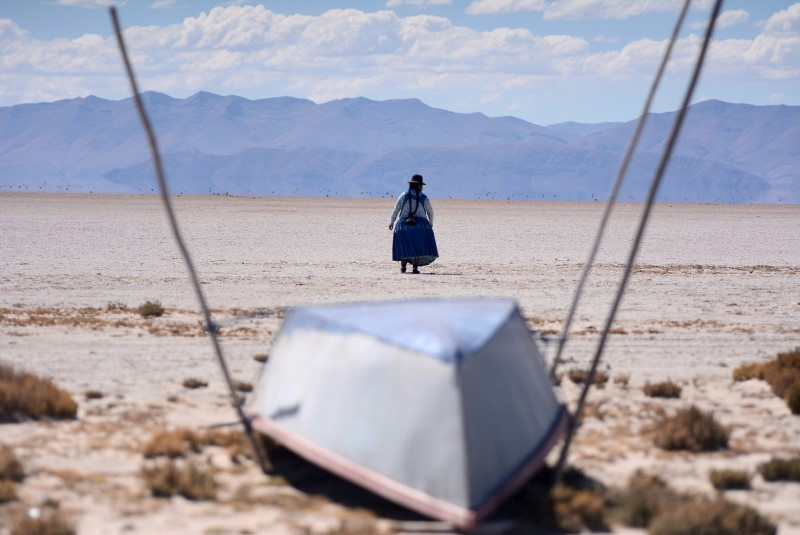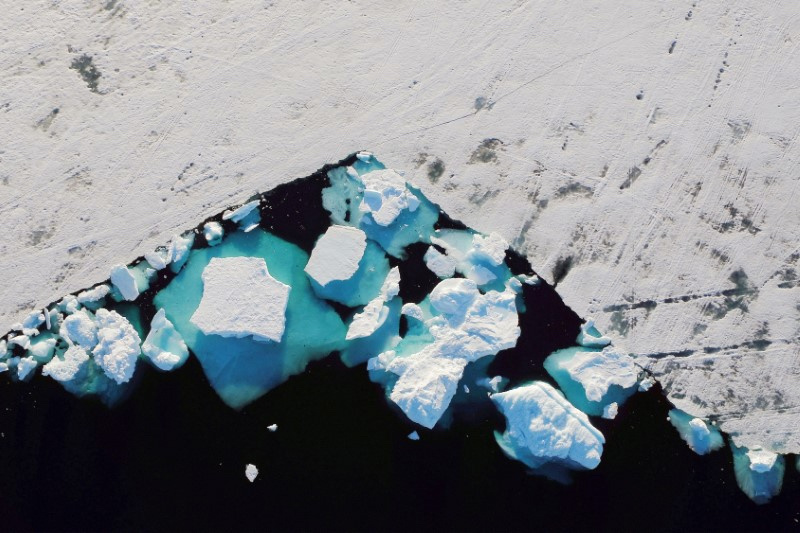Updated 12.30pm (AEST)
Reuters
Global warming is dangerously close to spiralling out of control, a UN climate panel said in a landmark report Monday, warning the world is already certain to face further climate disruptions for decades, if not centuries, to come.
Humans are “unequivocally” to blame, the report from the scientists of the Intergovernmental Panel on Climate Change said. Rapid action to cut greenhouse gas emissions could limit some impacts, but others are now locked in.
The deadly heat waves, gargantuan hurricanes and other weather extremes that are already happening will only become more severe.

Cristina Mamani walks near an unused boat in Lake Poopo, Bolivia’s second largest lake which has dried up due to water diversion for regional irrigation needs and a warmer, drier climate, according to local residents and scientists, in Lake Poopo, Bolivia, on 24th July. PICTURE: Reuters/Claudia Morales
Monday alone saw 500,000 acres of forest burning in California, while in Venice tourists waded through ankle-deep water in St Mark’s Square.
UN Secretary-General António Guterres described the report as a “code red for humanity”.
WORLD CHURCHES BODY SAYS LATEST IPCC REPORT A “MAJOR ALARM BELL” AND CALLS FOR MORE ACTION TO TACKLE CLIMATE CHANGE
The latest IPCC report is a “major alarm bell”, according to the World Council of Churches.
The WCC’s Deputy General Secretary Rev Dr Odair Pedroso Mateus said in a statement that the “signs of the times have never been clearer”.
“The report is a major alarm bell,” he said. “Its concern is high on the agenda of the next assembly of the WCC.”
Mateus said it had never been more urgent for all governments, but especially those representing wealthy countries and historical polluters, to ramp up nationally determined contributions with a view to attaining net zero emissions as soon as possible.
“This situation demands nothing less than urgent and fundamental transformation to net-zero societies and economies, within a framework of justice and solidarity,” he said. “We have the necessary financial and technological means to respond vigorously to the climate emergency, and these must be shared with poor and vulnerable communities that contributed least to the crisis.”
– DAVID ADAMS/Sight
“The alarm bells are deafening,” he said in a statement. “This report must sound a death knell for coal and fossil fuels, before they destroy our planet.”
In an interview with Reuters, activist Greta Thunberg called on the public and media to put “massive” pressure on governments to act.
In three months, the UN COP26 climate conference in Glasgow, Scotland, will try to wring much more ambitious climate action out of the nations of the world, and the money to go with it.
Drawing on more than 14,000 scientific studies, the IPCC report gives the most comprehensive and detailed picture yet of how climate change is altering the natural world – and what could still be ahead.
Unless immediate, rapid and large-scale action is taken to reduce emissions, the report says, the average global temperature is likely to reach or cross the 1.5 degree Celsius warming threshold within 20 years.
The pledges to cut emissions made so far are nowhere near enough to start reducing level of greenhouse gases – mostly carbon dioxide (CO2) from burning fossil fuels – accumulated in the atmosphere.
“Wake-up call”
Governments and campaigners reacted to the findings with alarm.
British Prime Minister Boris Johnson said he hoped the report would be “a wake-up call for the world to take action now, before we meet in Glasgow”.
US President Joe Biden tweeted Monday: “We can’t wait to tackle the climate crisis. The signs are unmistakable. The science is undeniable. And the cost of inaction keeps mounting.”
The report says emissions “unequivocally caused by human activities” have already pushed the average global temperature up 1.1 degrees Celsius from its pre-industrial average – and would have raised it 0.5 degrees further without the tempering effect of pollution in the atmosphere.

An iceberg floats in a fjord near the town of Tasiilaq, Greenland, on 18th June, 2018. PICTURE: Reuters/Lucas Jackson/File photo.
That means that, even as societies move away from fossil fuels, temperatures will be pushed up again by the loss of the airborne pollutants that come with them and currently reflect away some of the sun’s heat.
A rise of 1.5 degrees is generally seen as the most that humanity could cope with without suffering widespread economic and social upheaval.
The 1.1 degree of warming already recorded has been enough to unleash disastrous weather. This year, heat waves killed hundreds in the Pacific Northwest and smashed records around the world. Wildfires fuelled by heat and drought are sweeping away entire towns in the US West, releasing record carbon dioxide emissions from Siberian forests, and driving Greeks to flee their homes by ferry.
Further warming could mean that in some places, people could die just from going outside.
“The more we push the climate system…the greater the odds we cross thresholds that we can only poorly project,” said IPCC co-author Bob Kopp, a climate scientist at Rutgers University.
Irreversible
Some changes are already “locked in”. Greenland’s sheet of land-ice is “virtually certain” to continue melting, and raising the sea level, which will continue to rise for centuries to come as the oceans warm and expand.
“We are now committed to some aspects of climate change, some of which are irreversible for hundreds to thousands of years,” said IPCC co-author Tamsin Edwards, a climate scientist at King’s College London. “But the more we limit warming, the more we can avoid or slow down those changes.”
But even to slow climate change, the report says, the world is running out of time.
– Additional reporting by JAKE SPRING in Brasilia, VALERIE VOLCOVICI in Washington and EMMA FARGE in Geneva.






